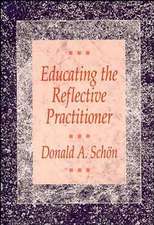The International Handbook of Collaborative Learning: Educational Psychology Handbook
Editat de Cindy Hmelo-Silver, Clark Chinn, Carol Chan, Angela O'Donnellen Limba Engleză Paperback – 5 feb 2013
Key features include the following:
- Comprehensive and Global – This is the first book to provide a comprehensive review of the widely scattered research on collaborative learning including the contributions of many international authors.
- Cross disciplinary – The field of collaborative learning is highly interdisciplinary drawing scholars from psychology, computer science, mathematics education, science education, and educational technology. Within psychology, the book brings together perspectives from cognitive, social, and developmental psychology as well as from the cross-disciplinary field of the learning sciences.
- Chapter Structure – To ensure consistency across the book, authors have organized their chapters around integrative themes and issues. Each chapter author summarizes the accumulated literature related to their chapter topic and identifies the strengths and weaknesses of the supporting evidence.
- Strong Methodology – Each chapter within the extensive methodology section describes a specific methodology, its underlying assumptions, and provide examples of its application.
| Toate formatele și edițiile | Preț | Express |
|---|---|---|
| Paperback (1) | 962.37 lei 6-8 săpt. | |
| Taylor & Francis – 5 feb 2013 | 962.37 lei 6-8 săpt. | |
| Hardback (1) | 1949.90 lei 6-8 săpt. | |
| Taylor & Francis – 4 feb 2013 | 1949.90 lei 6-8 săpt. |
Din seria Educational Psychology Handbook
- 9%
 Preț: 804.33 lei
Preț: 804.33 lei - 9%
 Preț: 768.08 lei
Preț: 768.08 lei - 9%
 Preț: 804.77 lei
Preț: 804.77 lei - 5%
 Preț: 731.20 lei
Preț: 731.20 lei - 25%
 Preț: 666.31 lei
Preț: 666.31 lei - 18%
 Preț: 806.90 lei
Preț: 806.90 lei - 9%
 Preț: 1798.95 lei
Preț: 1798.95 lei - 18%
 Preț: 856.66 lei
Preț: 856.66 lei - 25%
 Preț: 689.67 lei
Preț: 689.67 lei - 18%
 Preț: 859.58 lei
Preț: 859.58 lei - 18%
 Preț: 851.93 lei
Preț: 851.93 lei - 18%
 Preț: 849.52 lei
Preț: 849.52 lei - 18%
 Preț: 965.19 lei
Preț: 965.19 lei - 18%
 Preț: 857.42 lei
Preț: 857.42 lei - 18%
 Preț: 794.30 lei
Preț: 794.30 lei - 25%
 Preț: 607.05 lei
Preț: 607.05 lei - 18%
 Preț: 739.82 lei
Preț: 739.82 lei - 18%
 Preț: 811.49 lei
Preț: 811.49 lei - 18%
 Preț: 749.45 lei
Preț: 749.45 lei - 18%
 Preț: 791.60 lei
Preț: 791.60 lei - 18%
 Preț: 745.04 lei
Preț: 745.04 lei
Preț: 962.37 lei
Preț vechi: 1173.62 lei
-18% Nou
Puncte Express: 1444
Preț estimativ în valută:
184.17€ • 199.98$ • 154.70£
184.17€ • 199.98$ • 154.70£
Carte tipărită la comandă
Livrare economică 22 aprilie-06 mai
Preluare comenzi: 021 569.72.76
Specificații
ISBN-13: 9780415805742
ISBN-10: 0415805740
Pagini: 528
Ilustrații: 11 black & white tables
Dimensiuni: 178 x 254 x 28 mm
Greutate: 0.93 kg
Ediția:New.
Editura: Taylor & Francis
Colecția Routledge
Seria Educational Psychology Handbook
Locul publicării:Oxford, United Kingdom
ISBN-10: 0415805740
Pagini: 528
Ilustrații: 11 black & white tables
Dimensiuni: 178 x 254 x 28 mm
Greutate: 0.93 kg
Ediția:New.
Editura: Taylor & Francis
Colecția Routledge
Seria Educational Psychology Handbook
Locul publicării:Oxford, United Kingdom
Cuprins
Introduction: What is Collaborative Learning?: An Overview Angela O'Donnell & Cindy E. Hmelo-Silver I. Theoretical Approaches 1. Information Processing Approaches to Collaborative Learning Noreen Webb 2. Developmental Approaches to Collaborative Learning Susan Golbeck & Hebbah El Moslimany 3. Sociocultural Perspectives on Collaborative Learning: Towards Collaborative Knowledge Creation Kai Hakkarainen, Sami Paavola, & Pirita Seitamaa-Hakkarainen 4. Theories of Cognition in Collaborative Learning Gerry Stahl II. Studying Collaborative Learning 5. Quantitative Methods for Studying Small Groups Ulrike Cress & Friedrich-Wilhelm Hesse 6. Multilevel Analysis for the Analysis of Collaborative Learning Jeroen Janssen, Ulrike Cress, Gijsbert Erkens, & Paul A. Kirschner 7. Qualitative Methodologies for Studying Small Groups Keith Sawyer 8. Conversation Analysis and Collaborative Learning Tim Koschmann 9. Verbal Data Analysis for Understanding Interactions Heisawn Jeong 10. Linguistic Analysis Methods for Studying Small Groups Iris Howley, Elijah Mayfield & Carolyn Penstein Rosé 11. Advancing Understanding of Collaborative Learning with Data Derived from Video Records Brigid J. S. Barron, Roy Pea, & Randi A. Engle 12. Mixed Methods for Analyzing Collaborative Learning Sadhana Puntambekar III. Instructional Issues and Approaches to Collaborative Learning 13. Cultivating a Community of Learners in K-12 Classrooms Katerine Bielaczyc, Manu Kapur, & Allan Collins 14. Motivation in Collaborative Groups Toni Kempler Rogat, Lisa Linnenbrink-Garcia, & Nicole DiDonato 15. Child Leaders in Collaborative Groups Brian Miller, Jingjing Sun, Xiaoying Wu, & Richard C. Anderson 16. Assessment in Collaborative Learning Jan Van Aalst 17. Collaborative Learning for Diverse Learners Adrian F. Ashman & Robyn M. Gillies 18. Learning Through Collaborative Argumentation Clark Chinn & Doug Clark 19. Organizing Collaborative Learning Experiences Around Subject Matter Domains: The Importance of Aligning Social and Intellectual Structures in Instruction Lindsay L. Cornelius, Leslie R. Herrenkohl & Jenna Wolfstone-Hay 20. The Group Investigation Approach to Cooperative Learning Shlomo Sharan, Yael Sharan, & Ivy Geok-chin Tan 21. Problem-based Learning: An Instructional Model of Collaborative Learning Cindy Hmelo-Silver & Christina DeSimone IV. Technology and Collaborative Learning 22. Designing Collaborative Learning Through Computer Support Vanessa Dennen & Chris Hoadley 23. Collaboration Scripts in Computer-Supported Collaborative Learning Frank Fischer, Ingo Kollar, Karsten Stegmann, Christof Wecker & Jan Zottmann 24. Mobile Computer Supported Collaborative Learning Chee-Kit Looi, Lung-Hsiang Wong, & Yanjie Song 25. Collaborative Knowledge Building: Towards a Knowledge Creation Perspective Carol Chan 26. Metacognition and Computer-Supported Collaborative Learning Phil Winne, Allyson Hadwin, & Nancy Perry 27. Collaboration in Informal Learning Environments: Access and Participation in Youth Virtual Communities Yasmin B. Kafai & Deborah A. Fields 28. Collaboration, Technology and Culture Jianwei Zhang
Descriere
Collaborative learning has become an increasingly important part of education, but the research supporting it is distributed across a wide variety of fields including social, cognitive, developmental, and educational psychology, instructional design, the learning sciences, educational technology, socio-cultural studies, and computer-supported collaborative learning. The goal of this book is to integrate theory and research across these diverse fields of study and, thereby, to forward our understanding of collaborative learning and its instructional applications.





















